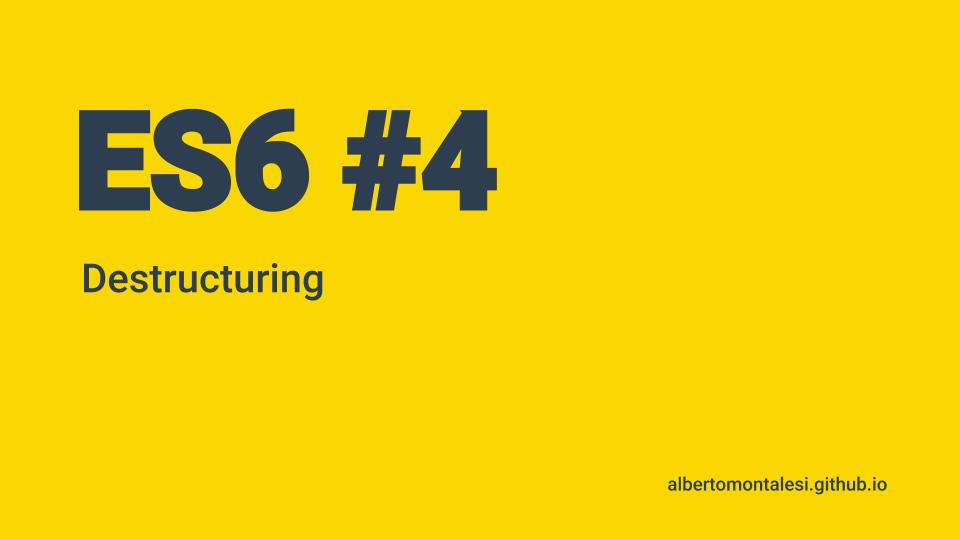JavaScript ES6 for Beginners #4: Destructuring

MDN defines destructuring like this:
The destructuring assignment syntax is a JavaScript expression that makes it possible to unpack values from arrays, or properties from objects, into distinct variables.
Let’s start with destructuring objects first.
Destructuring Objects
To create variables from an object we used to do this:
var person = {
first: "Alberto",
last: "Montalesi"
}
var first = person.first;
var last = person.last;
In ES6 we can now write this:
const person = {
first: "Alberto",
last: "Montalesi"
}
const { first, last } = person;
Since our const have the same name as the properties we want to grab, we don’t have to specify person.first and person.last anymore.
The same applies even when we have nested data, such as what we could get from an API.
const person = {
name: "Alberto",
last: "Montalesi",
links:{
social: {
facebook: "https://www.facebook.com/alberto.montalesi",
},
website: "http://albertomontalesi.github.io/"
}
}
const { facebook } = person.links.social;
We are not limited to name our variable the same as the property of the object, we can also rename it like this:
const { facebook:fb } = person.links.social;
// we rename the variable as *fb*
We can also pass in default values like this:
const { facebook:fb = "https://www.facebook.com"} = person.links.social;
// we renamed the variable to *fb* and we also set a default value to it
Destructuring Arrays
The first difference we notice when destructuring arrays is that we are going to use [] and not {}.
const person = ["Alberto","Montalesi",25];
const [name,surname,age] = person;
What if the number of variables that we create is less than the elements in the array?
const person = ["Alberto","Montalesi",25];
// we leave out age, we don't want it
const [name,surname] = person;
//the value of age will not be bound to any variable.
console.log(name,surname);
// Alberto Montalesi
Let’s say we want to grab all the other values remaining, we can use the rest operator:
const person = ["Alberto", "Montalesi", "pizza", "ice cream", "cheese cake"];
// we use the **rest operator** to grab all the remaining values
const [name,surname,...food] = person ;
console.log(food);
// Array [ "pizza", "ice cream", "cheese cake" ]
Swapping variables with destructuring
The destructuring assignment makes it extremely easy to swap variables, just look at this example:
let hungry = "yes";
let full = "no";
// after we eat we don't feel hungry anymore, we feel full, let's swap the values
[hungry, full] = [full, hungry];
console.log(hungry,full);
// no yes
It can’t get easier than this to swap values.
Destructuring functions
function totalBill({ total, tax = 0.1 }) {
return total + (total * tax);
}
// as you see since we are using the same names, we don't have to pass the arguments in the same order as when we declared the function
// we are also overriding the default value we set for the tax
const bill = totalBill({ tax: 0.15, total: 150});
This was the fourth part of my ES6 for beginners course, check out the rest of them here.
You can also read this articles on medium, on my profile.
Thank you for reading.

Leave a Comment